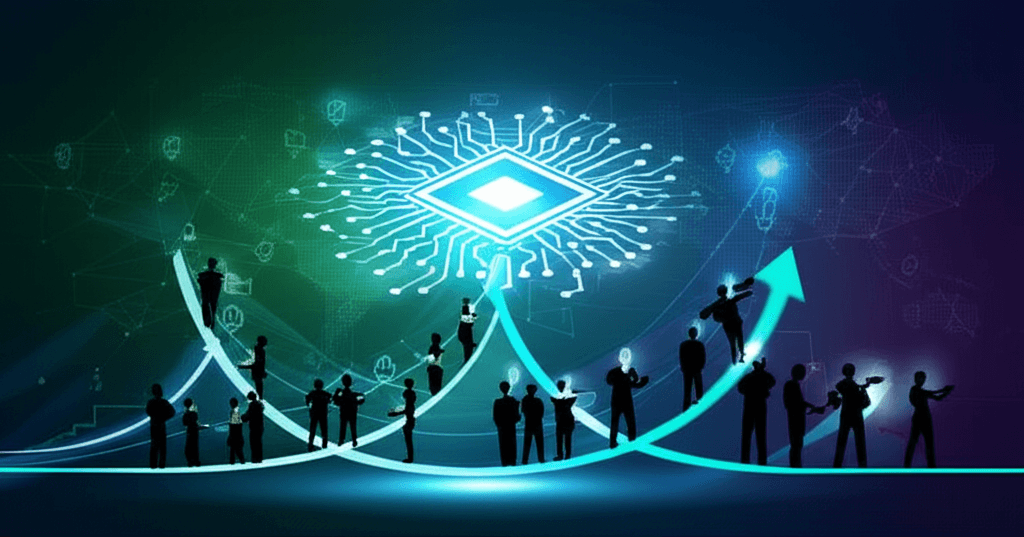AI Fuels Workforce Transformation: Skills Soar 20x, Job Demand Jumps Sixfold
The AI revolution: A sixfold surge in jobs and twentyfold jump in skills transform the professional landscape.
June 23, 2025

The professional landscape is undergoing a seismic shift, with artificial intelligence at its epicenter. Data from the professional networking platform LinkedIn reveals a dual-sided explosion in AI-related activity: job postings that mention AI have surged sixfold over the past year, while the number of members adding AI skills to their profiles has soared by an astonishing twentyfold.[1][2][3][4][5] This dramatic escalation underscores a rapid, simultaneous pivot from both employers and professionals toward embracing AI as a critical component of the modern workforce. The trend highlights not just a burgeoning demand for AI expertise but a proactive rush by individuals to acquire and showcase these new competencies, signaling a fundamental transformation in the skills required to remain competitive. As companies race to integrate AI, a new class of jobs is emerging, and professionals are quickly adapting to fill them, creating a dynamic and rapidly evolving talent market.
The surge in demand for AI talent is not a quiet evolution but a loud and clear signal from the job market. The sixfold increase in job postings requiring AI skills is a stark indicator of how deeply and quickly companies are embedding this technology into their operations.[1][2][3][4][5] This demand isn't confined to the tech sector; it spans across industries from healthcare and finance to retail, all seeking to leverage AI for everything from diagnostic tools and fraud detection to customer analytics.[6] Job listings that mention AI or generative AI are receiving significantly more attention, with application growth for these roles increasing 17% over the past two years compared to those that do not mention AI.[7][8] This heightened interest reflects a workforce that is not only aware of but eager to engage with emerging technologies. The creation of new roles, such as "Head of AI," has tripled in the last five years, with growth accelerating in the past year alone.[7] This trend points to a strategic shift within organizations, elevating AI from a technical tool to a core business function requiring executive leadership. The data suggests a market in transition, where companies that empower employees with AI tools and training are more likely to attract top talent.[9]
On the other side of the recruitment coin, professionals are responding to this demand with unprecedented speed. The twentyfold jump in LinkedIn members adding AI skills to their profiles is a testament to a workforce actively future-proofing its careers.[1][2][4][5] Skills related to specific generative AI tools like ChatGPT and Microsoft's Copilot are among the most popular additions, with one report showing a 142-fold increase in members adding such skills.[7][9] This upskilling is not limited to technical professionals; non-technical workers are also flocking to learn AI, with a 160% spike in professionals using LinkedIn Learning courses to build their AI aptitude.[7][9] This proactive learning is driven by a strong belief that AI proficiency is essential for career advancement and opportunity. A significant majority of professionals—76%—believe they need AI skills to remain competitive, while 79% say these skills will broaden their job opportunities.[7] This widespread skill adoption indicates that employees are not waiting for their companies to provide training; they are taking the initiative to stay ahead of the curve, recognizing that AI literacy is rapidly becoming a baseline expectation for many roles.[9]
The implications of this dual surge are profound, creating a new dynamic in the labor market characterized by both opportunity and disruption. For employers, the race for AI talent is fierce. Many leaders now prioritize AI skills over years of experience, with 71% stating they would rather hire a less experienced candidate with AI skills than a more seasoned one without them.[7] This shift creates a significant talent gap, as the demand for qualified candidates outpaces the current supply, a shortage that some analysts predict will last for years.[10] This gap puts pressure on companies to not only hire skilled individuals but also to invest heavily in upskilling their existing workforce. For employees, the message is clear: adapt or risk being left behind. While AI is creating new roles, it is also transforming existing ones, with estimates suggesting that a large percentage of current job tasks could be augmented or automated by AI.[11][12] This leads to a sense of uncertainty for many workers, with a notable portion expressing concern that AI could replace their jobs.[7] However, it also opens doors for those who are willing to learn and adapt. The rapid changes mean that even those not changing jobs will need to reskill to keep up with how their roles are evolving.[13]
In conclusion, the exponential growth in both AI-related job postings and the addition of AI skills on professional profiles paints a vivid picture of a workforce in the midst of a profound technological revolution. The sixfold increase in demand from employers and the twentyfold surge in skill adoption by professionals on LinkedIn are not isolated statistics but interconnected trends defining the future of work.[1][2][4][5] This rapid realignment is creating a more dynamic, skills-focused labor market where the ability to learn and adapt to new technologies like AI is becoming the most valuable asset for both individuals and organizations. While this transition brings challenges, including a significant skills gap and workforce uncertainty, it also signals a democratizing force, creating new opportunities for those who embrace continuous learning.[14][15] The "AI-first" mindset is no longer a niche concept for tech companies but a mainstream imperative for navigating the modern professional landscape.[13][15]